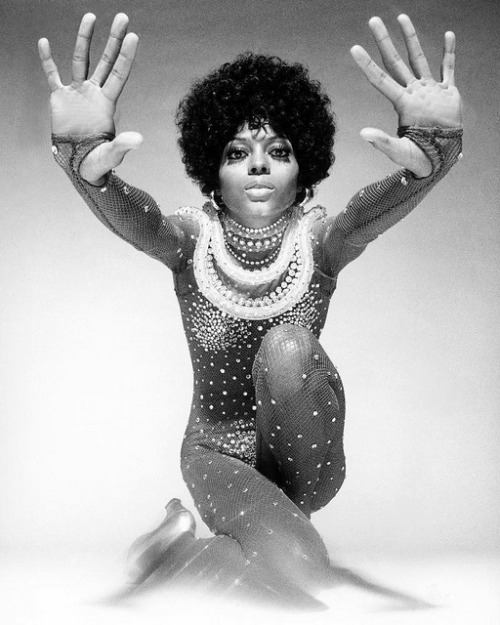Or perhaps my less-than-manic appreciation for Ross was due to the story of The Supremes, which Ross ruled with an iron, diamond-encrusted fist. I've always seen myself as one of the underdogs and a champion of them, too, so rooting for my fellow canines has been something of a lifelong calling. In the story of The Supremes, the underdogs would be Mary Wilson and the late Florence Ballard. Ross couldn't have shoved them into the background of the group they had started together as teenagers in Detroit without a major assist from Berry Gordy, Motown's founder and her one-time paramour (if you've seen Dreamgirls, you know that part of the story). But did she have to play the role of triumphant beauty queen at all cost so well? (The hair, the gowns, the jewels, the glamour of it all.)
I've never been so into the fierce and fabulous larger-than-life diva with big hair and an even bigger ego. I've always preferred my female pop obsessions sweeter, more modest, emphasizing goodness as much as glamour. So I always regarded Ross with a little suspicion and a lot of fear. I heard that music's other "The Boss" (to quote the title of her 1979 Top 20 hit), the female one, was quite the ball-buster!
But there's no denying her talent and influence. Diana Ross was to the '60s (as a Supreme) and to the '70s (as a solo act and Best Actress Oscar nominee for the 1972 film Lady Sings the Blues) what Madonna was to the '80s, what Mariah Carey was to the '90s, what Britney Spears was to the '00s, and what Rihanna and Katy Perry are to the '10s. In the world of pop without edge, where beauty and melody rule, she was everything. It's been decades since Ross, who turns 70 today, March 26, last scored a chart triumph, but her greatest hits -- 10 of which I offer here as a birthday tribute -- will forever resonate in the pop kingdom she once called her house.
"When the Lovelight Starts Shining Through His Eyes" The Supremes (1963) I prefer Dusty Springfield's rendition of the often-overlooked Holland-Dozier-Holland gem (from A Girl Called Dusty, her 1964 debut), but I still appreciate the rarely exhibited grit that Ross brought to the proceedings on the trio's first Top 40 hit (No. 23).
"Come See About Me" The Supremes (1964) In the 1980s, four British acts -- Soft Cell, Phil Collins, The Hollies and Kim Wilde -- all scored hits with covers of Supremes No. 1's ("Where Did Our Love Go," "You Can't Hurry Love," "Stop! In the Name of Love" and "You Keep Me Hangin' On," respectively), while as far as I know, the only Brit with the guts to make this one over was Wales' Shakin' Stevens, who failed where the others succeeded (on the charts).
"Reflections" Diana Ross & The Supremes (1967) The debut of the re-christened trio and its new psychedelic-pop sound dwelt on days past while signalling future days, the final ones of the Ross-led Supremes and also of its near-infallible hit machine. After four consecutive previous No. 1's, this one peaked at No. 2, beginning a reversal of chart fortunes that would send only two more Supremes singles -- 1968's "Love Child" and 1969's "Someday We'll Be Together" -- to the top before Ross's departure following the latter.
"Upside Down" (1980) The first time Diana Ross the solo star really mattered to me. Hands down the best thing she ever did, with or without The Supremes.
"Why Do Fools Fall in Love" (1981) It might seem like a strange move to mark a much-hyped label switch (from Motown to RCA Records) with a faithful cover of a 1950s teen-pop classic, but Ross quietly ran away with the song, turning it into a Top 10 hit in both the U.S. and the UK.
"Mirror, Mirror" (1981) Incredibly, 1980's one-two punch of "Upside Down" and "I'm Coming Out" aside, the follow-up to "Fools" marked the only time in Ross's career that she scored consecutive solo Top 10 hits on Billboard's Hot 100.
"Muscles" (1982) Can you imagine a major female pop star delivering such shameless camp with a straight face today? Or a supposedly heterosexual male pop star (in this case, Michael Jackson) actually admitting to writing it? The sudden key change at 3:37 still gives me chills.
"Pieces of Ice" (1983) Having peaked at a lowly No. 31, Ross's contribution to the then-blooming new-wave genre is probably her best song that you've never heard (or don't remember).
"All of You" (1984) Pop fans were still too gaga over "To All the Girls I've Loved Before," Julio Iglesias's No. 5 duet with Willie Nelson, to realize that his pairing with Diana Ross actually produced the better song, which stalled 14 notches lower.
"Chain Reaction" (1985) It was perhaps the most tell-tale sign of Ross's waning commercial clout that Barry Gibb, the Midas who, with his brothers Robin and Maurice, had crafted early '80s smashes for Ross contemporaries like Barbra Streisand and Dionne Warwick, not to mention Kenny Rogers, couldn't get Ross higher than No. 66 on Billboard's Hot 100. As a consolation prize, though, it topped the UK singles chart, the second solo Ross single to do so, the other, curiously, being 1971's "I'm Still Waiting," another non-U.S. hit that peaked in the 60s (No. 63, to be exact).


No comments:
Post a Comment